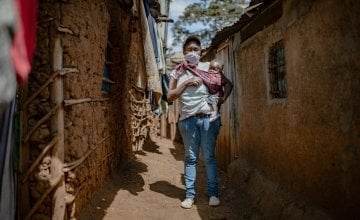
Knowledge Hub
The facts: the impact of Covid-19 in the world’s poorest countries

The results of a survey measuring the impact of coronavirus (Covid-19) in 23 countries has just been released. The conclusion: the pandemic is having a widespread and severe impact on some of the world’s poorest and most vulnerable people, including access to food, livelihoods and education.
We have all been affected by Covid-19, but not equally. Experiences of the pandemic have greatly differed household to household, city to city, and country to country. With the rise of pandemic fatigue-meets-pandemic anger, empathy levels are at risk of declining. If we turn our gaze to the international community, in particular vulnerable communities struggling to deal with the Covid-19 pandemic, losing that empathy – and ultimately support – would be catastrophic: “In this unique moment of global humanitarian crisis. It is vital that the world listens to them and responds to their needs. We will not get a second chance.” - Concern Worldwide Chief Executive Dominic MacSorely.
Luckily, thanks to the research undertaken by the eight member organisations of the Alliance2015 group (including Concern Worldwide), we have almost 14,000 vulnerable people’s first-hand experience of the pandemic to build a better picture of the true impact of Covid-19 in the world’s poorest counties.
The facts
The research measured the impact of the pandemic across the areas of food, income, access to health and education, and community dynamics. The results below come from the first-hand experience of 13,820 people in 23 countries.
Firstly, the outcomes showed a worrying impact on food quantity and quality, as well as people’s ability to earn an income:
- Over 40% of all respondents experienced a decrease in food quantity and quality.
- 90% said their ability to earn an income was worse than before the pandemic.
Other aspects of life in the world’s poorest countries that have been hit the hardest are education, and health and wellbeing:
- Two-thirds of respondents who live in households with children consider their access to education has reduced, compared to the time before Covid-19;
- One-third of those surveyed considered that the health and well being of their family were worse now than before the pandemic hit.
Who have been hit the hardest?
If we look at the report a bit closer and break down the demographics, older people, those with disabilities, women and children were considered to be the worst affected.
The proportion of respondents who reported a decrease in food quantity was highest in the Democratic Republic of the Congo, Malawi, Ecuador and Kenya. Those who considered that the quality of food they had, had reduced since the pandemic, were highest in Kenya, Ecuador, Malawi and Afghanistan.
Casual labourers and small scale traders were hardest hit in terms of ability to earn and income. Moreover, the research found that three-quarters of respondents who received remittances said these payments had either decreased or had stopped completely during the pandemic.

Why are these countries and communities affected so badly?
Preventing the spread of disease is much more difficult in many of the areas we work due to a number of factors. The report found that while there was awareness among those surveyed of the virus and the steps necessary to protect themselves against it, masks and soap were not affordable for up to a third of the respondents. In the case of up to a quarter of the people surveyed, masks were not available. Furthermore, large household numbers meant that social distancing was not possible for 38% of respondents living in camps.
The world must listen
This valuable researched has given us the ability to establish the true extent of Covid-19’s impact on the lives of the world’s most vulnerable people.
In response to the discoveries in the report, Concern Worldwide Chief Executive Dominic MacSorley said: “The findings, which are based on the first-hand testimony of thousands of people we work with, show the devastating impacts of this virus on food security, on people’s livelihoods and their children’s access to education.”
“This research provides a voice for people who are bearing the full brunt of Covid-19, people who even prior to the pandemic were struggling to survive,” he said. “It puts a spotlight on how communities are coping and where they need support at this unique moment of global humanitarian crisis. It is vital that the world listens to them and responds to their needs. We will not get a second chance.”
If you’d like to support our work tackling Covid-19 in the some of the world’s poorest countries, please done here.
Other ways to help
Donate now
Give a one-off, or a monthly, donation today.
Join an event
From mountain trekking to marathon running, join us for one of our many exciting outdoor events!
Buy a gift
With an extensive range of alternative gifts, we have something to suit everybody.
Leave a gift in your will
Leave the world a better place with a life-changing legacy.
Become a corporate supporter
We partner with a range of organisations that share our passion and the results have been fantastic.
Create your own fundraising event
Raise money for Concern by organising your own charity fundraising event.





